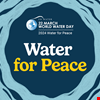
/ Southern Africa
Flowing Towards Harmony: Using Transboundary Water Cooperation for Peace in Southern Africa
Growing populations and climatic impacts are placing unprecedented pressure on water resources. This is true of the Southern African Development Community (SADC) region which comprises 16 Member States, whose population in 2018, was estimated to be at 345.2 million, a rise from 336.9 million as of 2017. Rivers play a pivotal role in the region's socio-economic development, as evidenced by its reliance on these waterways. Southern Africa boasts of 15 major transboundary river basins, shared among neighbouring countries, with 13 basins entirely within the region's borders. However, the equitable distribution of water resources remains a challenge, exacerbated by climatic factors influencing rainfall patterns and the geographical distribution of river basins. While these rivers can spark conflicts, they also serve as conduits for peace and cooperation. Therefore, prioritizing transboundary water cooperation is not merely about economic prosperity but also essential for nurturing stability and harmony throughout the region.
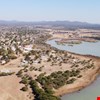
/ Southern Africa
Four Southern African countries to Launch A USD 6 million GEF - Funded Transboundary Project for Sustainable Development in the Limpopo River Basin
On Thursday, 14 March, four water ministers from Botswana, Mozambique, South Africa, and Zimbabwe will launch the “Integrated Transboundary River Basin Management for the Sustainable Development of the Limpopo River Basin (UNDP-GEF Limpopo project) to which the Global Water Partnership Southern Africa is providing technical support. The Project will be officially launched in Musina, South Africa.
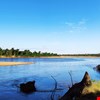
/ Southern Africa
Strengthening Integrated Transboundary Management of the Limpopo
Alignment and harmonization of individual workstreams as well as counterpart workstreams by all technical partners of the UNDP-GEF Limpopo project is critical to the success of the project. This was the key message that came out of the Integration Workshop for the project “Integrated Transboundary River Basin Management for the Sustainable Development of the Limpopo River Basin,” held on 7-8 February 2024 in a hybrid format coordinated from Pretoria, South Africa. The GEF-funded project is being implemented by United Nations Development Programme (UNDP), with Global Water Partnership Southern African (GWPSA) as the regional executing agency.
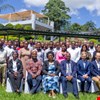
/ Southern Africa
Eswatini kick-starts water-related climate finance initiative: A step toward climate resilience
In a bid to bolster climate resilience and address the growing impacts of climate change on water resources, the Government of Eswatini has initiated the development of three water-related concept notes. Collaborating with the Ministry of Natural Resources and Energy, the Department of Water Affairs, and the Ministry of Tourism and Environmental Affairs, Eswatini is set to receive technical support from the Global Water Partnership Southern Africa Partnership.
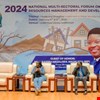
/ Southern Africa
Tanzania launches response strategies to help solve major challenges to water resources management
Tanzania has launched response strategies that will support the country in resolving the country’s three major barriers to water resources management. Launched during the 2024 National Multi-Stakeholder Forum (NMSF) on 11th and 12th February, the strategies were developed under the Global Water Leadership Programme (GWL) which the Global Water Partnership Tanzania was implementing in collaboration with the Government of Tanzania. The GWL programme, a global initiative to support emerging leadership for improved water, sanitation and hygiene services, and climate resilience, is being implemented in various countries including Tanzania.
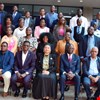
/ Southern Africa
Malawi’s WASH Sector Working Group approves Response Strategies developed under the Global Water Leadership Programme
Three response strategies to Malawi's major challenges in the water sector were presented and approved by the country's Sector Working Group for WASH on Wednesday, 7 February 2023.The meeting, which was attended by representatives from various players in the sector, took place at Bingu International Convention Centre (BICC) in Lilongwe. The three response strategies are addressing the sector’s major challenges, including inadequate financing and investments, lack of political will and leadership and weak coordination.

/ Southern Africa
Progressos notáveis registados na gestão de cheias e secas em BUPUSA
Os governos de Moçambique e do Zimbabué registaram progressos notáveis na construção de resiliência contra os choques climáticos, incluindo cheias e secas nas Bacias dos Rios Búzi, Pungoé e Save (BUPUSA), partilhadas exclusivamente pelos dois países.

/ Southern Africa
Remarkable progress recorded in flood and drought management in BUPUSA
The governments of Mozambique and Zimbabwe have recorded remarkable progress in building resilience against climate shocks, including floods and drought in the Buzi, Pungwe, and Save River Basins (BUPUSA), shared exclusively by the two countries.
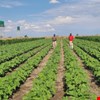
/ Southern Africa
GWPSA supports efforts to accelerate Water, Energy, & Food Nexus Investments at national, transboundary, and multi-country levels
The Global Water Partnership Southern Africa, GWPSA, is providing technical support toward the development of 8 national funding concept notes, 3 transboundary projects, and 2 multi-country funding proposals aimed at accelerating WEF investments in the region.
